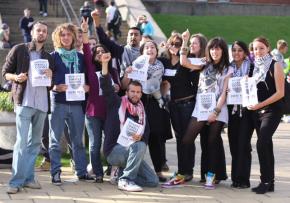Why we must cut ties to Israel
U.S. trade unionists began circulating an open letter in December to AFL-CIO President Richard Trumka, challenging his attack on the movement for boycott, sanctions and divestment (BDS) against Israel and explaining why the BDS movement is necessary, especially in the wake of Israel's brutal assault on Gaza a year ago.
While the letter received tremendous support, it also came under attack from some quarters. Here, Labor for Palestine responds to these attacks and issues a call for trade union members and activists to add their voices in solidarity with the Palestinian people.
LABOR FOR Palestine's December 14 "Open Letter from U.S. Trade Unionists to AFL-CIO President Richard Trumka: Boycott Apartheid Israel" has met with an overwhelmingly positive response.
The open letter, posted on the Labor for Palestine (LPF) Web site, supports the growing international campaign for boycott, divestment and sanctions (BDS) against Israel, by calling on trade unionists in the U.S. to divest from State of Israel Bonds, support workers' refusal to handle Israeli cargo, break ties with the racist Histadrut, and oppose U.S. military and economic aid for Israel.
In just a few short days, the letter has been published by Electronic Intifada, Dissident Voice, Global BDS Movement, Indymedia, International Jewish Anti-Zionist Network, MRZine, Palestinian World, Socialist Worker (U.S.), the Tehran Times, the U.S. Campaign for the Academic and Cultural Boycott of Israel, and the U.S. Palestinian Community Network. It has also been endorsed by nearly 64 additional U.S. labor signers, for a total of 94, and the number continues to grow.

The letter comes in response to the Palestinian call, adopted around the world and supported by all Palestinian trade unions, for BDS as an essential international action to support Palestinian rights.
It has also become clear that growing support for BDS is seen as a threat by those who would continue U.S. labor officialdom's support for the apartheid state of Israel, as evidenced by new attacks on Labor for Palestine.
On December 17, two of the letter's initial signers, Fred Mason, a co-convener of U.S. Labor Against the War and head of the Maryland AFL-CIO, and Clayola Brown of the A. Philip Randolph Institute, issued identical written statements demanding that their names be removed from the letter. The statements assert that they "had never seen such a letter or engaged in discussions about its content," and that it was "disrespectful that someone would attach my name to a document and circulate such a document without contact with me, or consent from me."
Brown's statement has been posted on the Web site of "Trade Unions Linking Israel and Palestine" under the heading, "Leading Black trade unionist expresses 'disgust and dismay' at misuse of her name by pro-BDS campaigners." As explained in LFP's open letter, TULIP was founded to derail the growing international labor support for BDS that has followed Israel's massacres in Gaza.
LFP immediately honored the requests to remove both names. However, the claim that either had been listed without their knowledge of permission is a complete fabrication.
In fact, Fred Mason and Clayola Brown were among 21 people who signed the letter at a U.S. Labor Against the War (USLAW) national meeting held in Chicago on December 5. Their endorsements, written in their own hand (signatures 5 and 6.) can be viewed here. Nonetheless, "TULIP" has refused to remove Brown's defamatory statement from its Web site.
These false assertions come as no surprise. Dishonesty underlies the entire attempt to undermine BDS, and to shore up Israeli apartheid, occupation and oppression.
As the first anniversary of Israel's massacre in Gaza approaches, LFP will escalate this campaign by posting the expanded list of open letter signers, activating a new and expanded Web site, creating a listserv for LFP supporters and organizing future action. We ask you to join LFP in supporting the call for BDS, and in standing up against any attempt to silence U.S. workers' voices in solidarity with our Palestinian brothers and sisters.
Workers around the world are responding to the Palestinian call to cut ties with apartheid oppression. In the 1980s, workers stood together around the world to combat South African apartheid--and we can do no less today.


